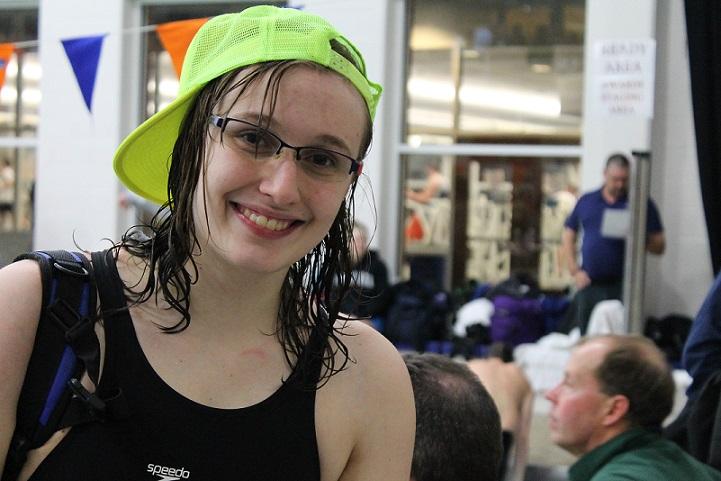Emily Nielsen’s day is a hectic one. Being that she is a full time student, it is filled with classes, studying and writing, with her major being English writing with an emphasis in creative writing.
Now, add in several hours of practice that comes from being a student athlete. Add in even more time spent in team meetings. Also, take away the weekends and evenings because she will be gone traveling for competition. This life sets a student up for a lot of mental and physical stress. So why would someone put themselves through this?
Fellow student athlete and former roommate of Emily’s , Rachel Breault, simply states, “Because I love it and I love the team. Being a college athlete is one the best decisions I have ever made.”
Here at Millikin University, an NCAA Division III school, students do not receive money or scholarships to play in any sport. So, students are pouring their hearts into their sport purely for love of the game.
However, the love of the game can be short-tracked because of the stress that is placed on the athlete. There is a probable chance that in four years’ time of competing at the college level, the athlete will get injured. It is an unfortunate reality that comes with the daily grind of any sport. It is a reality that leaves college athletes feeling cheated.
Due to the repetitive motion in sports, most student athletes did it to themselves all out of hard work in the hopes to excel in their sport.
“Many endurance sport injuries are due to over-use, or essentially loading the tissue with too much stress,” Patrick Larry, an athletic trainer at Millikin, said. “Inflammation is a key component in these non-acute injuries that are common in such athletes.”
Larry explained the mechanics behind overuse injuries.
“Chemical signals in this inflamed tissue cause an increase in cells that ‘clean up’ to come in and break down damaged tissue,” he said. “The tissue, including capillaries, become more permeable, or ‘leaky’.
“Fluid and ‘cleanup cells’ can build up. This effect is cumulative with too much work, and not enough recovery (rest, lower intensity exercise, sleep, proper nutrition). The body can not catch up with break-down, removal, and repair.”
Nielsen knows all too well this seemingly earth-shattering reality.
Her passion for the time spent in the pool is evident.
“Whenever I am having a bad day I look forward to practice,” Nielsen said. “Even if it is hard, the second I am in the water I will feel better. After practice I feel so much better, happier, more energetic. The water takes all my worries and it’s always been that way.”
But Nielsen’s shoulder disagrees with her and disregards her love of swimming. She has been dealing with a shoulder injury for the past three years.
Larry knows Nielsen’s dilemma.
“In swimmers for instance, this often manifests as a shoulder injury,” he said. “Tendonitis, bursitis, shoulder impingement, even strains of the rotator cuff muscles that range from painful irritation to complete tears.”
Nielsen’s shoulder will swell to three times the size it should be. Quite frankly, the muscles in her shoulder are begging her to stop pursuing her goals of making finals in conference and breaking the Millikin record in the backstroke.
But Nielsen, like a true Division III athlete, has an immeasurable love for her sport. So much so, that she is willing to push the limits just so she can continue to do what she loves to do—all because she cannot imagine life without it.
“Giving up the familiarity of swimming is harder than I would ever imagine and harder than dealing with the physical pain,” she said.
It’s the emotional side of injury that Nielson is referring to that many athletes deal with.
“Swimming is such a part of my life,” Nielson said. “It is my identity. The people on the team are my family. I would feel disconnected from a group of people that play such a significant part of my life.”
She knows the price she’s paying to continue to swim.
“I get [angry] and then guilty,” she said. “I know I did this to myself. I know I could have avoided it. But I know that stopping would be worse than the physical pain I am in.”
She does admit that there is a fine line to walk between what is best for her health and what is best for swimming.
“I have to think of my well being outside of the pool,” Nielsen said. “I can hardly write or take notes without pain. I have to think about my education, not can I swim for 2 more years.”
Nielsen is just one of the many student athletes competing in college athletics across the country that deal with this dilemma.
Breault who also competes in an endurance sport, running, has also faced overuse injuries.
“When I get injured, I get so frustrated,” she said. “I know my issues with my knees have came about because of all the running I do, but being apart of the team is so important to me.”
It all comes down to, what is more important to that individual? Is this the last chance in their lifetime to compete in that sport alongside a team or the ability to participate in their sport long term recreationally, but not at the demanding level of a college athlete?
For Nielsen, she is hopeful that her shoulder will prevail and that she will be back to swimming by this coming winter of 2014. She also knows that she will never completely give up her sport.
“After college, I will probably still swim,” she said. “Swimming will always be a part of my life.”
One can only hope that this will be the case for Millikin’s passionate swimmer. The determination that Nielson has would only lead one to believe that this story will have a happy and successful ending.

